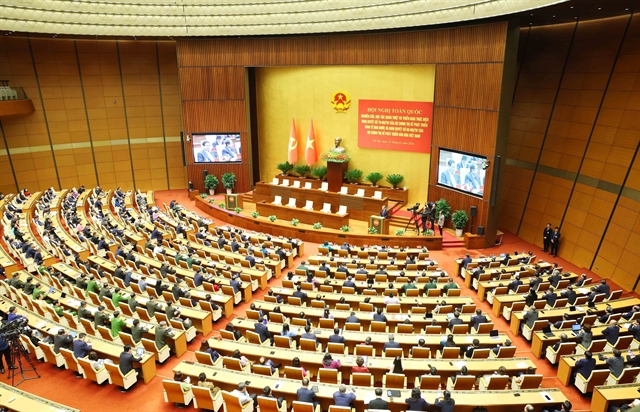 Politics & Law
Politics & Law


|
| Lào Cai market surveillance authorities inspect the products and prices listed on a company website during its ongoing crackdown on counterfeit and low-quality goods and products without clear origins. — VNA/VNS Photo |
HÀ NỘI — The National Assembly on Wednesday officially passed a law amending and supplementing several provisions of the Law on Quality of Products and Goods, with 408 out of 420 deputies present voting in favour, or 85.4 per cent.
The newly revised law introduces several significant changes that have drawn considerable public and regulatory interest, particularly regarding the quality of goods and products.
The original law, which was passed by the parliament in 2007 and took effect in July 2008, has provided a vital legal framework for monitoring the quality of domestically produced and imported goods, but with the rapid growth of e-commerce, sweeping digital transformation and increasing international integration, the 17-year-old law has shown its age.
To institutionalise major policy directions on science and technology development, innovation, and enhancing national competitiveness, significant changes will be necessary.
The revised law consists of three articles and 27 clauses, amending 29 articles, adding 14 new articles, and removing 34 articles and three clauses from two articles. It will take effect on January 1, 2026.
One of the key changes includes the amendment and supplementation of Article 8 concerning “prohibited acts”. These now include: disseminating false or misleading information or advertisements regarding the quality, origin or provenance of products and goods; trading in products or goods that do not conform to declared standards or relevant technical regulations or that lack clear origin – especially on digital platforms used for electronic transactions – in ways that mislead or deceive consumers.
It also prohibits concealing information about risks associated with products and goods that could affect human health, animal and plant safety, property or the environment.
In addition, a new Clause 14 has been added following Clause 13, which prohibits engaging in unfair competition related to the quality of products or goods that may cause confusion or harm to other individuals or organisations.
The amended law also revises Article 48 on the assignment, decentralisation of responsibilities and coordination in quality inspections. Under this, quality inspection agencies under ministries, ministerial-level agencies and the Government Cipher Committee are tasked with inspecting the quality of products during production, as well as goods for export, import and market circulation within their designated management scope.
Notably, the law also delegates authority to communal-level People’s Committees to coordinate with market surveillance forces and quality inspection agencies at various levels to inspect the quality of circulating goods and products.
In Article 54a, titled “consumer protection lawsuits and violation warnings”, it is stipulated that social organisations involved in consumer protection have the right to file civil lawsuits to defend the collective interests of consumers when goods or products fail to meet applicable declared standards or technical regulations, resulting in consumer harm.
The amendment to Clause 1 of Article 56 specifies that the statute of limitations for lawsuits over the quality of products and goods between buyers and sellers must comply with the provisions of the Civil Code.
Under Article 61, “liability for damages”, the law states that sellers and importers must compensate buyers and consumers if damage arises due to their fault in supplying goods that do not meet declared standards or relevant technical regulations. Compensation is to be determined through agreement between the parties or by court or arbitral decision.
According to Minister of Science and Technology Nguyễn Mạnh Hùng, the revised law marks a strategic shift aiming to “reduce compliance costs for businesses while still protecting consumers, and aligning with international practices.” The amendments are expected to establish a more balanced relationship among the State, businesses, and consumers, providing greater flexibility for enterprises, more substantive consumer protections, and a more modern approach to State governance.
One of the key breakthroughs in the law is a new approach to product classification, moving towards a three-tier risk-based classification system. Minister Hùng explained that this change is designed to streamline management by reducing pre-market checks while enhancing post-market monitoring and ongoing supervision.
For the first time, the law introduces the concept of a National Quality Infrastructure (NQI) – an ecosystem encompassing standards, regulations, metrology, testing, certification and accreditation. Minister Hùng described this as an essential foundation for ensuring product quality, fostering trade and international integration, boosting productivity and innovation, and protecting public safety and the environment, while also enhancing state governance.
Viewing quality management as a type of national infrastructure, comparable to transport, electricity and water systems, Minister Hùng argued that the State should invest in and operate the NQI to support businesses and organisations in improving product quality. This strategic step will enhance the ability to monitor, issue early warnings and trace non-compliant products, while also linking data across customs, specialised inspections and the international alert system.— VNS




